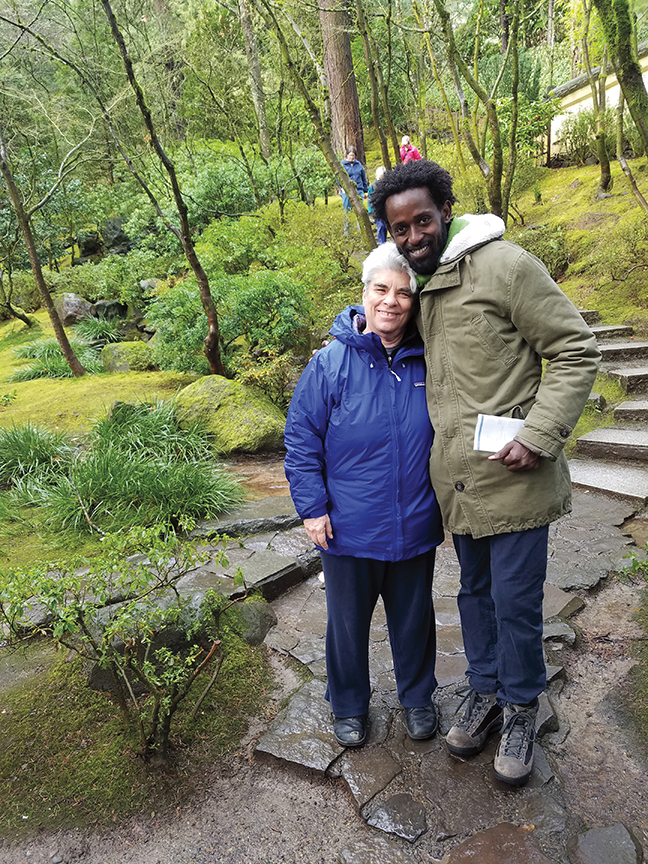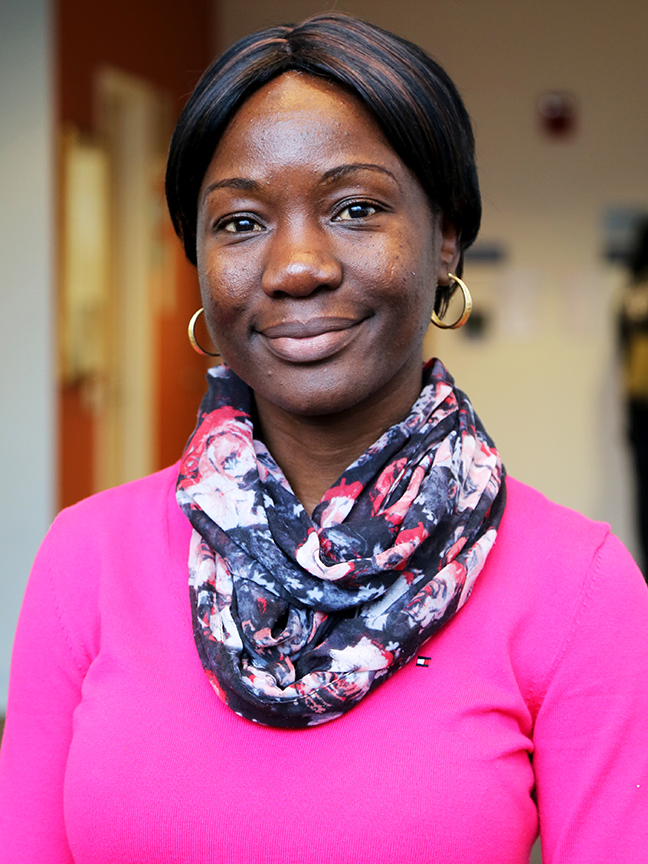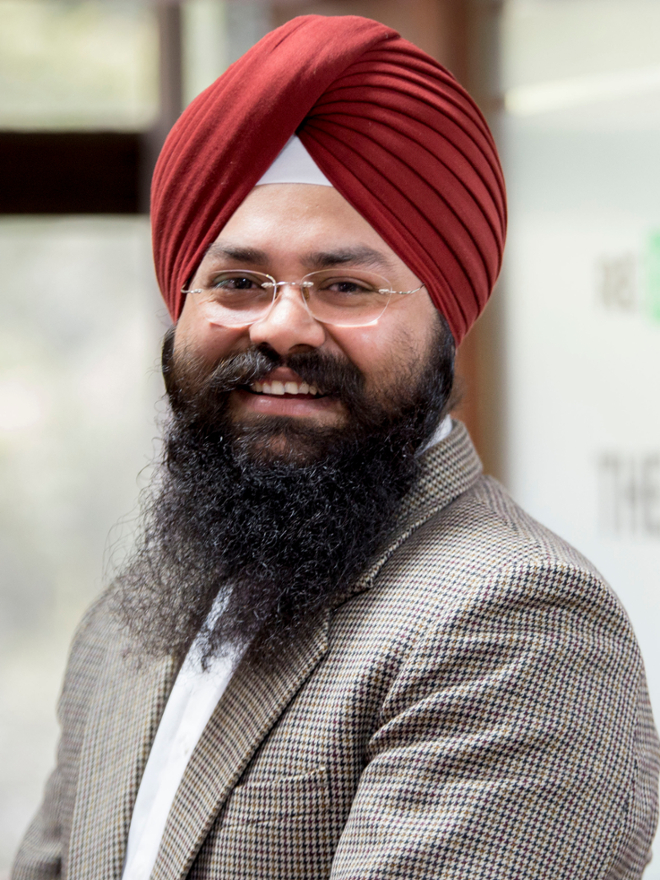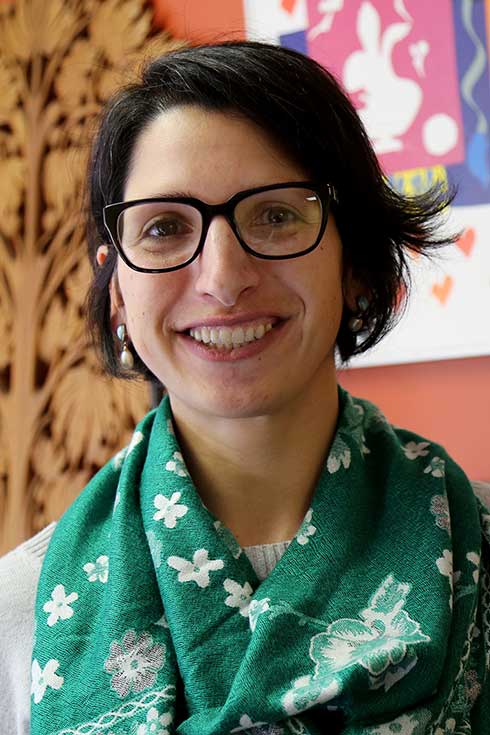By Karen Shih

A sick family member. A sudden landlord change. A drop in the value of a country’s currency.
Any of these reasons could cut short a promising student’s graduate education. Her carefully calculated budget could go out the window in an instant—forcing her back to her home country without the skills, connections and experiences she could have gained at Heller to create social change.
But it doesn’t have to be that way, says Elinor Gollay, MSW’71, PhD’77.
Gollay knows firsthand the impact a scholarship can have on a student. While she was at Heller pursuing her PhD—when the school offered only doctoral degrees—every student received a full fellowship. Last year, she set up a scholarship to help students who would not otherwise be able to attend or remain at Heller, especially international students.
“These extraordinary young people show up with all the hopes in the world of becoming better professionals, with the hopes of their communities and families,” she says. “It’s not acceptable for them to come all this way and be sent home because they can’t come up with $200 or $1,000.”
Gollay reconnected with Heller in recent years when her old friend Marty Krauss, PhD’81, became the interim dean in 2014. Gollay discovered how much the school had changed since her time as a student: Heller now had five master’s degree programs, and the increased diversity of the student body—which draws applicants from across the U.S. and around the world—was striking.
“These students have a vision for their country, for their people, and it inspires me,” says Gollay, who emphasizes the need to give the dean flexibility with funds to handle with unexpected circumstances. “My hope is that the students I support can go out into the world and make it a better place.”
Dean David Weil is thankful for Gollay’s support, as well as that of generous alumni and friends who give Heller students opportunities to succeed. Their donations are critical as traditional sources of graduate funding, including government fellowships, have declined. Through named fellowships and other scholarships, they empower new generations of development professionals, public policy analysts, nonprofit leaders and more.
“Because many of our students come from areas of the world with a great deal of social conflict and economic instability, it means they face enormous challenges in supporting their studies,” says Weil. “We want students here to be able to focus on their studies, on gaining the skills and abilities to go out into the world and undertake the kind of social justice work that drew them to us—then take it to a higher level.”
At a time when America’s leaders are advocating pulling back from global engagement, it’s essential for institutions like Brandeis University to step up, he says.
“They’re saying the world’s problems are not our problems, but for so many people in our community, that’s the wrong message,” he says. “This is a particularly poignant moment to create those international connections.”
Today there are over 4,100 Heller alumni, and roughly 20 percent of them live outside of the United States. Every year, about one-third of incoming students travel from another country to earn a degree from Heller. Here are the stories of three alumni whose lives were transformed by their Heller experiences:
Farida Mushi, MS’16 (Namibia and Tanzania), Technical Specialist, IntraHealth International

“My career had reached a brick wall,” says Farida Mushi. As a pharmacist in Tanzania, her home country, and Namibia for more than a decade, she had peaked in what she could do with her existing skills.
“I wanted more knowledge on policy change, systems strengthening,” she says. “I saw gaps in areas like maternal mortality and reproductive health, and felt like something more could be done. That’s why I thought global health policy could equip me to go in that direction.”
She learned about Heller from a friend who had met MS Program Director Diana Bowser, and decided the nine-month program was the best fit—though she didn’t know if she would be able to manage it financially.
Thanks to the Charles, PhD’78, and Fran Rodgers Endowed Fellowship, which covered part of her costs, she was able to take the year off and come to the United States.
“I got more than I expected at Heller,” Mushi says. “Everything from the classes and the professors, to the optional training in Excel, to the Career Development Center staff and website.”
Now, Mushi says her current role at IntraHealth International ideally combines her pre-Heller career and the skills she learned at Heller. She works in supply chain management for antiretroviral medicines for HIV, which takes advantage of her experience managing drug and supply inventories, as well as the data analysis and reporting she learned through classes and research experience with Bowser.
None of this would have been possible without her fellowship.
“Potential donors might not know how much they are changing society,” she says. “Their support might be helping a mother back in a village in Namibia or Tanzania, because they’re helping one person to have the knowledge to go and change or implement policy.”
Jarnail Singh, MA SID’13 (India), India Director, The Climate Group

Just five years after graduating from Heller, Jarnail Singh is the head of all Indian operations for the Climate Group, a London-based organization dedicated to accelerating global climate action.
That’s something he never could have imagined before earning his master’s degree in sustainable international development.
“The skills I gained at Heller allowed me to grow within the organization,” he says. “The Climate Group wanted a strategist who could look beyond the obvious. The leadership traits I picked up during my time at Heller—coupled with technical knowledge—that’s what did the trick.”
Of all the initiatives he oversees, which includes unlocking barriers to energy access financing and working with multinational corporations to achieve 100 percent renewable electricity, he’s most proud of the India Energy Access Summit. It has become a major event endorsed by the Indian government and attended by global philanthropic organizations.
“I had a critical role in its conception, and it’s very exciting that it’s grown to be recognized,” Singh says.
He first became interested in environmental conservation in college. After earning a master’s degree in environmental studies, he went to work for the Energy and Resources Institute, shifting rural communities from using kerosene lamps to solar energy.
“I realized that energy is one of the key drivers for development that happens on the ground,” he says. “That’s when I thought I needed to learn and explore development more.”
But since he was the primary breadwinner for his family, leaving India to pursue a graduate degree seemed out of reach—until he received the Feldman Foundation Endowed Fellowship at Heller, which fully covered his expenses, including travel and tuition, for the two-year program.
Singh hopes to be able to give back one day as well. “As a donor, you’re investing in the future for the planet. To face the challenges of global catastrophes, from epidemics to war to climate change, we need to invest in these key leaders and make sure they make their impact, irrespective of finances.”
Megan Casey, MA COEX’18 (Iraq), Communications and Operations Manager, Mediators Beyond Borders International

“When I found out about the coexistence and conflict resolution program at Heller, I thought it was out of my own imagination,” says Megan Casey. “It seemed created for me.”
The Baghdad native knows firsthand the horrors of war. She had just started law school in Iraq in 2003 when her father was killed, forcing her to stop her studies and provide for her family. The best-paying option: become a translator for the U.S. Army.
“It was terrifying. I was seen as a traitor, cooperating with the ‘infidels,’” she says. “But as I worked with the soldiers, I realized they weren’t just there to kill people. They brought communities food and medical assistance.”
“Through that experience, I got to see how language and communication can make a difference.”
That’s why she’s dedicated her career to creating dialogues, especially in communities or countries where there are limits on conversation about taboo or difficult topics.
Casey came to the United States in 2009 on a Special Immigrant Visa for Iraqi and Afghan translators. She got a scholarship to Queens College in New York City, where she studied history, focusing on human rights and genocide. She worked with a program called Places of Pilgrimage, which helps women from the Middle East and North Africa discuss topics like rape, leaving religion and women’s independence through intensive writing and theater workshops. While at Queens, a colleague forwarded her an email about Heller’s COEX program—and she knew she had to go.
She shared her workshop experiences with her COEX cohort through her Capstone presentation, and she’s is now developing monologues and scenes that came out of the workshop that reflect her own experiences as a queer, Iraqi woman—which she hopes will one day be performed throughout the Arab world.
She’s grateful for all the support she received at Heller, both financially and emotionally.
“I’m thankful there was the Topol Fellowship” in Nonviolence Practice, she says, which fully funded her tuition. “Otherwise Heller would have remained a dream.”
“I never would have met my classmates, who had so much love. Everybody wanted everybody else to succeed. They’d say, ‘I want you to be whatever you want to be in the world. I’m going to cheer you on.’ That spirit—it’s what the world needs. It touched me in a deep way. I am changed forever because I have these people now in my life.”
Want to get involved?
We’re eager to welcome all alumni back to Heller. In addition to creating or supporting existing scholarships, there are many ways to stay engaged with the Heller community. Here are just a few:
- Introduce a friend or colleague to Heller’s graduate programs. “There’s no more powerful way for a prospective student, doing great work in their home country, to learn about our programs,” says Dean David Weil.
- Open up your office for an employer visit, mentor a current student in your field or connect with the Career Development Office to post an internship opportunity.
- Come to campus for a visit. Sit in on a class, chat with students and meet with faculty. “What I’m trying to convey to my fellow alumni, especially those who went years ago, is this is a richer, broader, more interesting school now than the one we attended,” says Elinor Gollay, MSW’71, PhD’77.
- Follow the Heller School on Facebook, Twitter, Instagram or LinkedIn to stay up to date on the accomplishments of students, faculty and alumni. See something you like? Share it with your network.
Contact Courtney Lombardo, associate director of development and external relations, at clombard@brandeis.edu or 781-736-3808 for more information.
